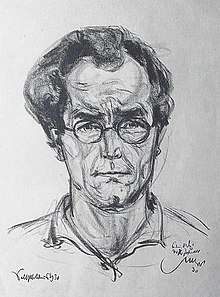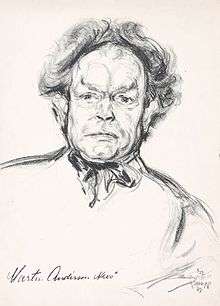Emil Stumpp
Emil Stumpp (17 March 1886, in Neckarzimmern – 5 April 1941, in Stuhm in West Prussia) was a German painter teacher and artist known for his cartoons and drawings of well-known people in the 1930s during the Weimar Republic. He died in 1941 in jail after returning to Germany. He had left after drawing an unflattering portrait of Adolf Hitler.[1]

Biography

Stumpp was born in Neckarzimmern in southeastern Germany, but he moved with his family at the age of three to Worms. When he was eight the family moved to Karlsruhe. Stumpp served in the first world war reaching the rank of lieutenant. His early education had been in Karlsruhe, Uppsala and in Berlin. He studied art as well as philosophy, history and German. In 1924 he left his teaching post to become a full-time artist, despite having a wife and five children to support.[2]
He was successful and created portraits of many well known people including Bertold Brecht, Käthe Kollwitz, Erich Mendelsohn, Chancellor Friedrich Ebert, Alfons Paquet,Thomas Mann,[2] Otto Braun[3] and Else Lasker-Schüler,[4] Le Corbusier.[1]
He was eventually commissioned to create a portrait of Adolf Hitler for his birthday in 1933. The work was not well received and the portrait, Strumpp, his paper (the ''General Anzeiger), and its editor were all prohibited.[5]
Stumpp left the country but returned in 1940 to tend to his terminally ill daughter. He rented an estate in Perwelke, East Prussia, and continued to be critical of the Nazi government. Denounced by his landlords, he was arrested and sentenced to one year in jail. He died of pneumonia in 1941, aggravated by malnutrition and mistreatment.[1]
Legacy
Stumpp was given an exhibition in Dortmund in 1996 at the Institut für Zeitungsforschung der Stadt.[6] He left about 6,000 drawings which were all drawn from life.[7]
References
- Portrait of Karl Schonherr, ArtofthePrint.com, accessed March 2009
- Thomas Mann Chronik, Gert Heine, Paul Schommer, 2004, ISBN 3-465-03235-7
- Der Maler und Nazigegner Emil Stumpp, 2002, accessed March 2009
- Cultures of Modernism, Cristanne Miller, accessed March 2009
- General Anzeiger , 20 April 1933, accessed March 2009
- Enil Stumpp: Pressezeichnungen. Bilder der Weimar Zeit Archived 2012-02-22 at the Wayback Machine, Peter, Karen, ISBN 3-88474-481-X, accessed 16 March 2009
- Archive Exhibition, Darmstadt, accessed 16 March 2009